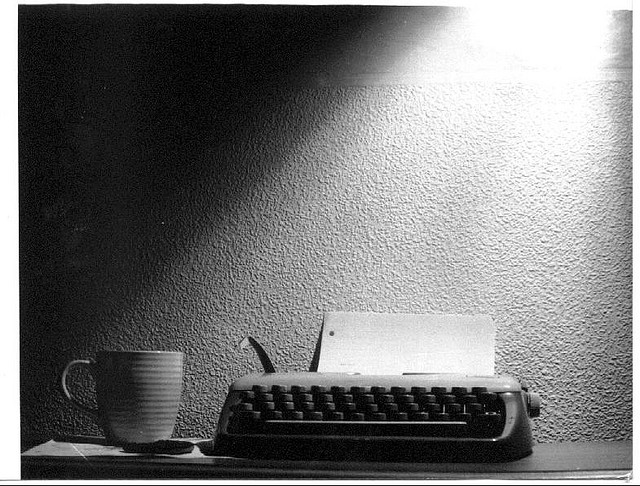Written by Megan Soyars
I’ve loved writing since I was very small. I have a particular memory from my toddler-hood, which I believe sparked my passion. I was watching my mother at the kitchen table, playing with a strange machine. The machine was small and gray and covered with the letters of the alphabet. I remember feeling a certain pride as I surveyed the letters. I knew them all, A-Z, and I even knew how they magically paired together to form words, and those words paired together to form sentences, and those sentences made stories that I could read and enjoy. Thomas the train, all these stories were my favorites.
As I watched my mother type away on the mysterious machine (it was a type writer) I noticed she was actually creating something. Sheets of paper came out of the machine, covered with the words my mother had typed. The sheets looked almost like the pages of the story books I read. As my mother pulled the sheets out of the typewriter, I asked her what she was doing.
“Writing!” she explained to me with a smile. “A story just like the ones we read together, only this story for grown-ups.”
I was amazed. I’d never considered that my story books were created by real people like my mom. It must take an enormous amount of talent to create a story, I figured. I was proud of my mother, and promised to read her story once I was a grown-up. And maybe I could become a story writer when I was a grown-up, too.
Seventeen years later, I’m a officially a grown-up, and (officially??) a writer. No, I’m not Neil Gaiman or Stephenie Meyer and maybe my works aren’t on the Times bestseller list or gracing the book shelves of the Barnes and Noble where I work, but I’m not really asking for fame/fortune. That’s rare for anybody to attain. But I’d like to know that some people are reading my stuff and enjoying it. I’ve had a couple writing internships (right now I’m working for the Campus Clipper), and I’ve messed around with fiction and poetry, and I’ve self-published a children’s novel. If you’re interested, you can check out my book at www.lulu.com/content/5494236.
Maybe you’ve been inspired to express your creativity through writing, or you’re a starting-out writer like me who needs some tips. I’ve added some that’ve helped me below:
BROADEN YOUR RANGE
You don’t always have to write on what you consider to be your “subject matter.” If you’re a short story writer, try your hand at news writing. If you’re in journalism school, take a poetry class. By exploring a different genre, you’re stretching different mental muscles, which allows for a better all-around workout (just like your gym teacher told you!). Then, once you’re versed in a new style of writing, you can incorporate it into your original technique.
PRACTICE MAKES PERFECT
Write (and read!) as much as you can. Take classes, seminars, and workshops. Practice on your own at home by starting up a blog or journal. Some writers set a specific schedule (such as a hour a day) that they spend writing. I don’t personally recommend the “set schedule” since it often made me feel like I was “forcing” myself to write out of duty rather than enjoyment. But if you discover you haven’t put your pen to paper (or finger to keyboard) in awhile, sit down and make time to write, even if you aren’t feeling particularly inspired.
DON’T STRESS OVER WRITER’S BLOCK
Everybody gets writer’s block at some point; sometimes the words just don’t flow. Don’t sit frustrated at your desk, tapping your pen against paper. Sometimes your mind works best when your body’s in motion. Get up, talk a walk, go jogging, whatever. Or even take a nice, long shower! It’s true–sometimes your best ideas do come to you while you’re in the shower. Just don’t bring your laptop into the bathroom with you (a la Weird Al in “White ‘n’ Nerdy). I’ve also discovered that taking a brief break helps overcome writer’s block. Put the manuscript away and come back to it in a couple days. That way, your mind’s fresh and has been given a chance to come up with some new ideas. And finally, if you find yourself stuck on a certain scene or paragraph, move to another section and start writing from there. You don’t always have to write in chronological order.
I hope these tips work for you the way they did for me. While working at the Campus Clipper, I’ve learned that there’s so many young people out there with their own distinctive talents. (For example, all the great writers of Campus Clipper’s book The NYC Student Guide.) Whatever your passion, whether it’s writing, or dance, or film, always remember to follow it 🙂
-Megan, Trinity University
Get great more Student Discounts!
Download our NEW App on iTunes!
Become a fan on Facebook and follow us on twitter!
Don’t forget to sign up for our bi-weekly newsletter for student promotions and coupons and download the coupon booklet NOW!


